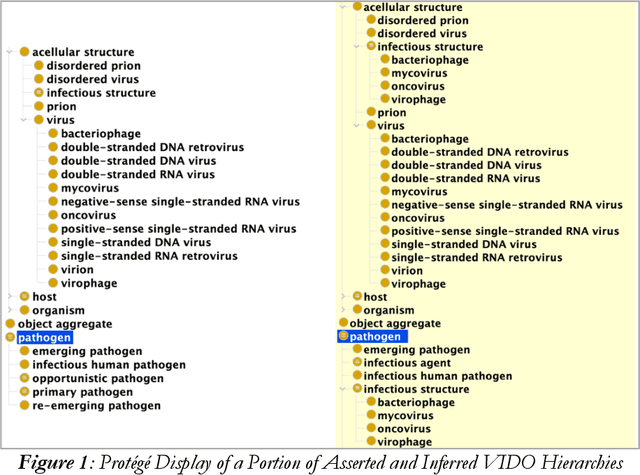Sydney Cohen
A Fourfold Pathogen Reference Ontology Suite
Dec 31, 2024



Abstract:Infectious diseases remain a critical global health challenge, and the integration of standardized ontologies plays a vital role in managing related data. The Infectious Disease Ontology (IDO) and its extensions, such as the Coronavirus Infectious Disease Ontology (CIDO), are essential for organizing and disseminating information related to infectious diseases. The COVID-19 pandemic highlighted the need for updating IDO and its virus-specific extensions. There is an additional need to update IDO extensions specific to bacteria, fungus, and parasite infectious diseases. We adopt the "hub and spoke" methodology to generate pathogen-specific extensions of IDO: Virus Infectious Disease Ontology (VIDO), Bacteria Infectious Disease Ontology (BIDO), Mycosis Infectious Disease Ontology (MIDO), and Parasite Infectious Disease Ontology (PIDO). The creation of pathogen-specific reference ontologies advances modularization and reusability of infectious disease data within the IDO ecosystem. Future work will focus on further refining these ontologies, creating new extensions, and developing application ontologies based on them, in line with ongoing efforts to standardize biological and biomedical terminologies for improved data sharing and analysis.
Mapping the Provenance Ontology to Basic Formal Ontology
Aug 02, 2024Abstract:The Provenance Ontology (PROV-O) is a World Wide Web Consortium (W3C) recommended ontology used to structure data about provenance across a wide variety of domains. Basic Formal Ontology (BFO) is a top-level ontology ISO/IEC standard used to structure a wide variety of ontologies, such as the OBO Foundry ontologies and the Common Core Ontologies (CCO). To enhance interoperability between these two ontologies, their extensions, and data organized by them, an alignment is presented according to a specific mapping criteria and methodology which prioritizes structural and semantic considerations. The ontology alignment is evaluated by checking its logical consistency with canonical examples of PROV-O instances and querying terms that do not satisfy the mapping criteria as formalized in SPARQL. A variety of semantic web technologies are used in support of FAIR (Findable, Accessible, Interoperable, Reusable) principles.
 Add to Chrome
Add to Chrome Add to Firefox
Add to Firefox Add to Edge
Add to Edge